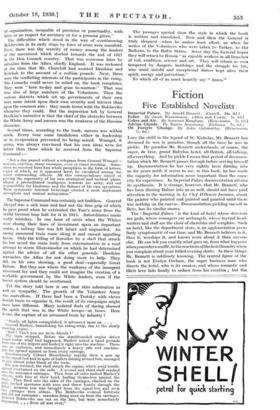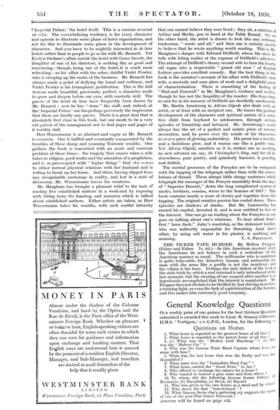Fiction
Five Established Novelists
7s. 6d.)
LIKE the child in the legend of St. Nicholas, Mr. Bennett has dreamed he was in paradise, though all the time he VMS in pickle. By paradise Mr. Bennett understands, of course, the super, de luxe, grand Babylon hotel, all-British, all-talking, all-everything. And by pickle I mean that period of documen- tation which Mr. Bennett passes through before serving himself up. Documentation he has very rightly been dinning into us for years until, it seems to me, in this book, he has made the capacity for infomuation more important than the capa- city for experience. In Imperial Palace documentation attains its apotheosis. It is strange, however, that Mr. Bennett, who has been dinning Balzac into us as well, should not have paid attention to the waming in Le Chef D'Oeuvre Incormu, about the painter who painted and painted and painted until there was nothing on the canvas. Documentation, pickling oneself in facts, has its similar snares.
The ' Imperial Palace ' is the kind of hotel whose directors are gods, whose managers are archangels, whose myriad head- waiters and staff are the choir of cherubim and seraphim. Such an hotel, like the department store, is an agglomeration pecu- liarly symptomatic of our time, and Mr. Bennett believes in it, likes it, worships it, and knows more about it than anyone else. He can tell you exactly what goes on, from what happens when you order a souffle, to the reactions of the hotel laundry when you complain about your frilled evening shirts. In these things Mr. Bennett is sublimely knowing. The central figure of the book is not Evelyn Oreham, the super business man who directs the hotel, who is its creator, and whom romantic and illicit love fails finally to seduce from his creation ; but the Imperial Palace,' the hotel itself. This is a curious reversal of riles. The overwhelming tendency is for every character and episode to illustrate some phase of hotel organization, and not for this to illuminate some phase in the development of character. And you have to be mightily interested in de luxe hotels rather than in people to go so far with Mr. Bennett. Yet Evelyn Orcham's affair outside the hotel with Grace Savott, the daughter of one of his directors, is nothing like as good and convincing—though, being out of the hotel, it is much more refreshing—as his affair with the sober, dutiful Violet Powler, who is creeping up the ranks of the business. Mr. Bennett has always made a point of deifying the banal and ordinary, and Violet Powler is his triumphant justification. This is the dull woman made beautiful, passionate, perfect, a character made to grow and deepen before our eyes, with masterly skill. The guests of the hotel de luxe have frequently been drawn by Mr. Bennett ; now he has " done " the staff, and, indeed, at the' Imperial Palace' one hasperhaps perversely the impression that there are hardly any guests. There is a great deal that is absolutely first class in this book, but one needs to be a very old patron of the management not to find pages and pages of it terribly dull.
Herr Wassermann is as abstract and vague as Mr. Bennett is concrete. One is baffled and eventually exasperated by the troubles of these damp and yearning Teutonic wraiths. One gathers the book is concerned with an acute and common problem of these times : the tragedy that ensues when a wife takes to religion, good works and the adoration of a prophetess, and is so preoccupied with " higher things " that she ccmes to abhor normal physical relations with her husband and is willing to break up her home. And there, having slipped from any recognizable anchorage in reality, and lost in a mist of discussion, Mr. Wassermann leaves his creatures.
Mr. Maugham has brought a pleasant relief to the task of reading five established authors in a week-end by exposing with biting irony the humbug and nonsense which is talked about established authors. Either artists are taken, as Herr Wassermann takes his wraiths, with such soulful intensity
that one cannot believe they ever lived ; they sit, a mixture of Arthur and .Merlin, pen in hand at the Table Round. Or, on the other hand, the artist is drawn to look like any ordinary tradesman, " warts and all," and then one is entirely unable to believe that he wrote anything worth reading. This is Mr. Maugham's danger with Edward Driffield, whose life story he tells with biting malice at the expense of Driffield's admirers. The attempt of Driffield's dreary second wife to turn the hearty old rogue into a respectable " grand old man " of English Letters provides excellent comedy. But the best thing in the book is the narrator's account of his affair with Driffield's first wife, a masterly and sane piece of work and a delightful piece of characterization. There is something of the feeling of "Hail and Farewell" in Mr. Maugham's coolness and malice, though he has not the limpidity of the master. His trapesinp to and fro in his memory of Driffield are decidedly mechanical.
Mr. Martin Armstrong in Adrian Glynde also deals with an artist, or at least with an incipient one. He traces the gradual development of the character and spiritual nature of a sensi- tive child from boyhood to adolescence, through certain episodes of friendship and betrayal. Mr. Armstrong's world always has the air of a perfect and sedate piece of interior decoration, and.' he pores over the minds of his characters as over a piece of glowing embroidery. His prose has a lucidity and a fastidious glow, and it warms one like a gentle wine, Yet Adrian Glynde, sensitive as it is, strikes one as marking no new advance on, say, SI. Christopher's Day, and for all its shrewdness, pure poetry, and spinsterly humour, is puzzling and dullish.
The mental processes of the Forsytes are to be compared with the tapping of the telegraph rather than with the coma- lutions of thread. Those abrupt little slangy sentences which telegraph the messages of the Forsyte mentality from the days of " Superior Dossett," down the long complicated system of uncles, brothers, cousins, wives to the Soames of 1917 l This book contains nearly a score of stories put together from this tapping. The original creative passion has cooled down. These episodes are shadows of shades. But Mr. Galsworthy has earned his capital, invested it, and is now entitled to live on the interest. One can go on reading about the Forsytes as one goes on talking about one's relations. To hear about June's first " lame duck," Juley's courtship, or the dishonest builder, who was indirectly responsible for thwarting Aunt Ann's affair, by using salt water in his plaster, is soothing and

























































 Previous page
Previous page